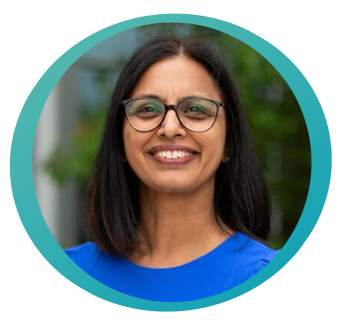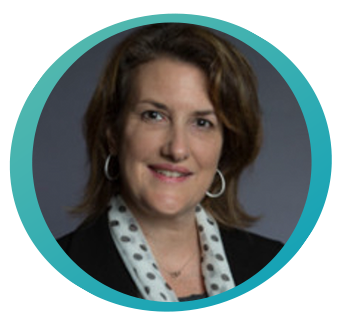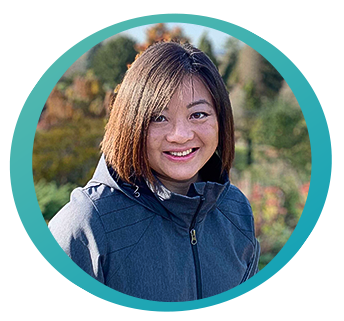AWS Hero Denis Astahov Brings Commitment to Community and OpsGuru Customers
OpsGuru is incredibly proud to have an AWS-elite expert on its staff....

“Be curious and learn to learn. It has always worked for me! I also believe that it’s never too late to learn something new.”
Rekha Rao-Mayya, Sales Leader ISV and Digital Native Businesses (DNB) at Amazon Web Services.
A really big assumption that people have about the technology industry is that you have to have a tech background to enter the field. That’s absolutely untrue. The tech sector has opportunities to grow at any stage that you can start from anywhere, even in the cloud. Suppose you ask people how they got into tech; you’ll get different answers from everyone - we know this because we had the opportunity to ask five very talented women how they got into the cloud and got five different answers.
Take Rekha for example, she was asked to prepare a presentation about technology trends - this sparked something in her that led her on a learning journey to working in cloud. Meanwhile Sonia Singh, Director of Sales at ISV/DNB at AWS had no intentions of entering tech. She wanted to change career paths to an industry with growing opportunities. Much like Delynn O'Sullivan, Senior Account Manager at Carbon60 wanted to go into an industry with the most future potential for her sales career. Maria Ellis, AWS Partner Sales & Development knew she wanted to take on a new challenge and prepared herself for it so when the time came for that job interview, she was ready. If you ask Mency Woo, Director of Enterprise & Public Sector at OpsGuru, she’ll tell you she’s been in cloud for over 12 years.
Five women, five different stories, all working in the same industry. We asked them about their experiences, how they got to where they are and the advice and resources they have for others, here’s what they said:

Sales Leader ISV and DNB at AWS
Linkedin: www.linkedin.com/in/rekhamayya
How did you get into the cloud?
In late 2007, I was asked to present to a large group about future technology trends. To prepare for the presentation, I dove deep into research and came across an article on the “Top 10 Disruptive Technologies of the Decade.” Cloud computing was on the list. This piqued my curiosity. Interestingly, the report mentioned AWSand how Amazon had launched a game changing, market making computing model with AWS. Little did I know that I would be fortunate enough to work for AWS! I started learning about Cloud computing, Infrastructure as a Service (IaaS) and Platform as a Service (PaaS) and started my learning journey.
What is one piece of advice you would give to women looking to get into the cloud industry?
Be curious and learn to learn. It has always worked for me! I also believe that it’s never too late to learn something new. Technology is ever-changing. Make the learning journey fresh and new every day.
What is one of your favourite resources (or tools) for learning more about cloud computing?
AWS Educate program is a great resource. AWS offers Cloud computing training for all levels of knowledge seekers, and there are many free courses.

Partner Sales & Development at AWS
Linkedin: https://www.linkedin.com/in/mariaellis/
How did you get into the cloud?
I, too, am a Prime Member! How ‘things’ got from one place to another fascinates me. I decided I wanted a career where I could continue learning and building from the ground up. I spent the summer preparing and learning all I could about the Cloud, reading, talking to partners and understanding the technology. When an opportunity emerged to interview at AWS, I was knowledgeable and ready to take on the challenge.
What is one piece of advice you would give to women looking to get into the cloud industry?
Confidence is key! Demonstrate your expertise, get certified to ensure your relevance and differentiate yourself. Be genuine; surround yourself with champions that will help you succeed and give you honest feedback. Find a mentor! Give back by paying it forward. Cloud is fast-paced. Change is inevitable (and fascinating) ...so roll with it!
What is one of your favourite resources (or tools) for learning more about cloud computing?
AWS provides career-based certification paths via podcast. Learning modules with A Cloud Guru and Udemy offer great examples to prepare you for the initial CPC certification and on to associate-based accreditations.

Director of Sales - ISV/DNB at AWS
LinkedIn: https://ca.linkedin.com/in/soniasingh11
How did you get into the Cloud?
Before getting into tech, I worked in finance and as an educator. I had no intentions of working in the tech sector. I was teaching and travelling around the world for five years and then decided that I wanted to come back to Canada and change careers. I had two primary goals in mind: find a new job that offered lots of opportunities in a growing field and transfer my skills to a new career. My mentor helped me see that my teaching skills were transferable to tech sales. For example, teaching a topic to a class of students was the same as presenting a product to a customer in a business setting. From there, my mentor and I worked on a shortlist of companies, and he helped make recommendations and referrals. The rest is history.
What is one piece of advice you would give to women looking to get into the cloud industry?
Perseverance and purpose are essential. There are times where you will want to give up, but you should keep on going and seek guidance from your supporting cast. You never know what could happen in the future. Giving up too early could set you back even further. Research future trends and pick untapped areas that offer tremendous growth potential.
What is one of your favourite resources (or tools) for learning more about cloud computing?
I always have two to four internal and external mentors that I bounce ideas off and learn from at any given time.
Extra: What is essential to know for people just getting started within the tech industry and looking to get into the cloud?

Senior Account Manager at Carbon60
LinkedIn: linkedin.com/in/delynno
How did you get into the cloud?
After returning from a year-long overseas backpacking trip, I met with a college friend to understand which industry would have the most future potential to pursue my sales career. Technology was the answer. I signed up with multiple recruiters, but the best reference was reaching out to my network. In 1999, I was introduced to a new start-up, where there were only two of us for the first few months, apart from the investors. Colocation and Internet B2B were the product lines. Over the next 20+ years, the company added cloud and Security Services to its portfolio while experiencing various acquisitions. This past year an acquisition led me on a different product path. However, I realized that I missed the cloud Conversation. I have since moved to a new company, Carbon60, which specializes in all things cloud, with the differentiator being in-house expertise from start to finish for our clients’ cloud journey.
What is one piece of advice you would give to women looking to get into the cloud industry?
Network, Network, Network. Attend events, and even if you meet just one new contact, it will be worth it. Also, it should never just be about what you need. The relationships should always aim to be reciprocal. Request informational meetings, but make sure you have done your homework, and you are not just asking your new contact basic questions. Their time is valuable. That person could be a future advocate or referral for you. Learn from others whenever you can.
What is one of your favourite resources (or tools) for learning more about cloud computing?
As I am in a sales role, the resources combine selling/consultation techniques and product training. Many company sites provide course modules as well as certifications. Additionally, sites such as Udemy offer a wide variety of course options.

Director of Enterprise & Public Sector at OpsGuru
LinkedIn: https://www.linkedin.com/in/mencywoo/
How did you get into the cloud?
I first got into the cloud in about 2009 as a software release engineer in a start-up company wholly built on AWS. I was responsible for developing a toolkit to build, deploy and test in different environments and maintain the high availability of the application on AWS. After experiencing how straightforward it was to provision and manage cloud resources using script and automation, I have hit the point of no return. I haven’t been away from the cloud ever since.
What is one piece of advice you would give to women looking to get into the cloud industry?
Don’t be afraid to try! Starting a project on the cloud is often a lot easier than you think. There are a lot of Youtube videos, blogs, walkthroughs that offer step-by-step learning. Cloud providers also provide free credits and resources to help you with experience -- take advantage of that.
What is one of your favourite resources (or tools) for learning more about Cloud Computing?
As a beginner, I recommend courses on Udemy or Coursera. But savvy on the cloud requires staying up-to-date with the latest innovations: daily doses of Hacker News, Reddit and Twitter generally help.
—
We want to thank Rekha, Sonia, Maria, Mency and Delynn for sharing their expertise. Their answers prove whether you’ve been working in tech for years, just getting started or thinking about where to take your career next, everyone can work in tech. You don’t have to start in this industry to get here; you can start from where you are, make a pivot, take a completely different path - there’s no one way to end up in this field or a sector, and there’s room for everyone, even up there in the cloud. If you’re looking to get into the cloud industry, check out job openings at OpsGuru here.
Women in Tech World is a national nonprofit organization that is dedicated to creating community action plans and educational programming to support and advance women within the tech industry. WiTWorld has listened to over 1,600 voices from Canadian women and men in the tech industry, resulting in the largest qualitative data set about women in the Canadian tech space. Women in Tech World is both collaborative and inclusive and welcomes all professionals in tech, including stakeholders, advocates, and allies.